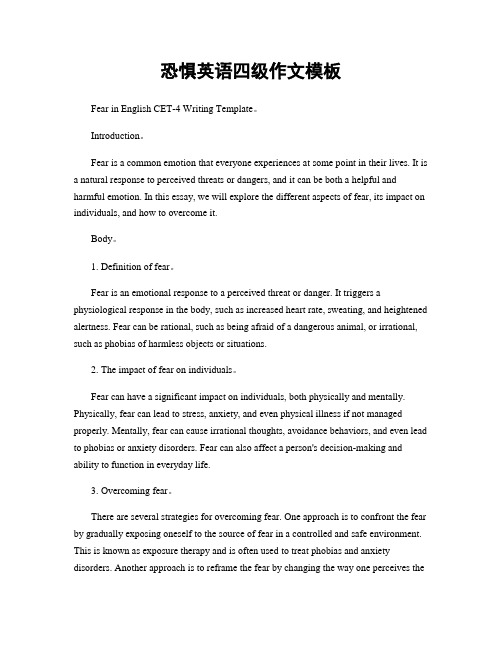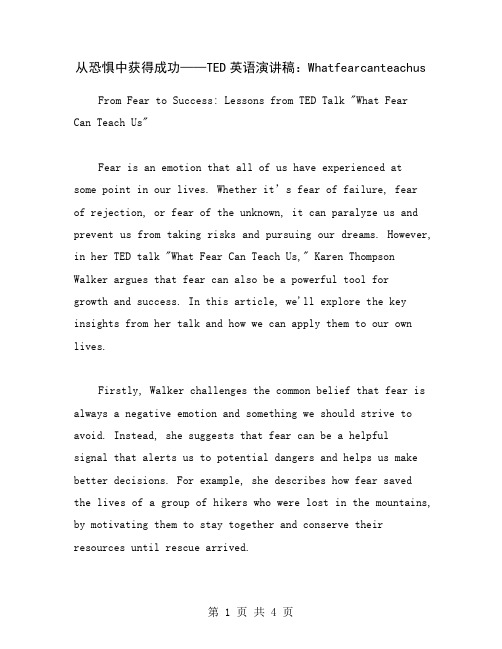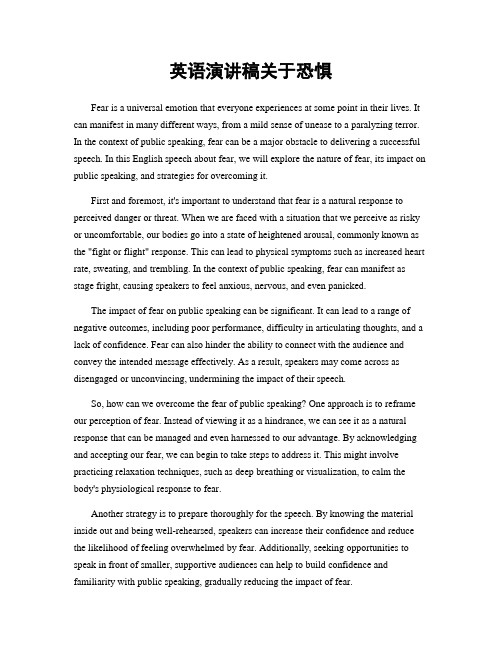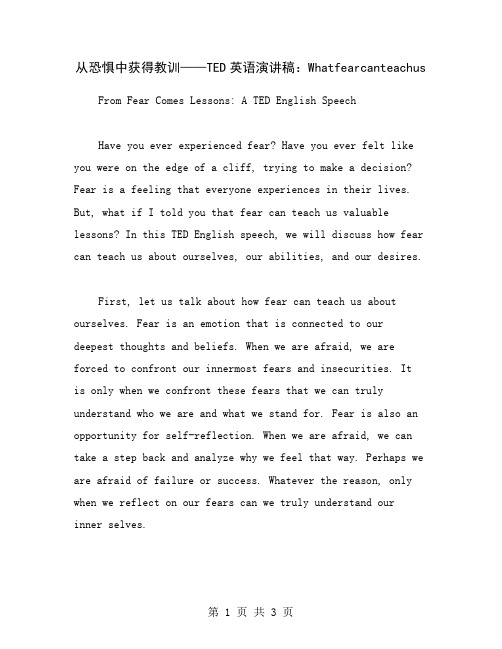英语演讲PPT——恐惧
TED英语演讲稿:What fear can teach us恐惧可以教会我们什么

TED英语演讲稿:What fear can teach us恐惧可以教会我们什么1819年的某一天,在距离智利海岸3000英里的地方,有一个太平洋上的最偏远的水域,20名美国船员目睹了他们的船只进水的场面。
they d been struck by a sperm whale, which had ripped a catastrophic hole in the ship s hull. as their ship began to sink beneath the swells, the men huddled together in three small whaleboats.他们和一头抹香鲸相撞,给船体撞了一个毁灭性的大洞。
当船在巨浪中开始沉没时,人们在三条救生小艇中抱作一团。
these men were 10,000 miles from home, more than 1,000 miles from the nearest scrap of land. in their small boats, they carried only rudimentary navigational equipment and limited supplies of food and water.这些人在离家10000万英里的地方,离最近的陆地也超过1000英里。
在他们的小艇中,他们只带了落后的导航设备和有限的食物和饮水。
these were the men of the whaleship essex, whose story would later inspire parts of moby dick.他们就是捕鲸船essex上的人们,后来的他们的故事成为《白鲸记》的一部分。
even in today s world, their situation would be really dire, but think about how much worse it would have been then.即使在当今的世界,碰上这种情况也够杯具的,更不用说在当时的情况有多糟糕。
2021年TED英语演讲稿 WHAT FEAR CAN TEACH US恐惧可以教(3)

TED英语演讲稿 What fear can teach us恐惧可以教(3) TED英语演讲稿:What fear can teach us恐惧可以教会我们什么Just like all great stories, our fears focus ourattention on a question that is as important in life as it is in literature: What will happen next?就像一个很好的故事,我们的恐惧也如同一部好的文学作品一样,将我们的注意力集中在对我们生命至关重要的问题上:后来发生了什么?In other words, our fears ___ke us think about the future. And hu ___ns, by the way, are the only creatures capable of thinking about the future in this way, of projecting ourselves forward in time, and this mental time travel is just one more thing that fears have in mon with story ___ing.换而言之,我们的恐惧让我们想到未来。
另外,人来是唯一有能力通过这种方式想到未来的生物,就是预测时间推移后我们的状况,这种精神上的时间旅行是恐惧与讲故事的另一个共同点。
As a writer, I can ___ you that a big part of writing fiction is learning to predict how one event in a story will affect all the other events, and fear works in that same way.我是一个作家,我要告诉你们写小说一个很重要的部分就是学会预测故事中一件事情如何影响另一件事情,恐惧也是同样这么做的。
恐惧英语四级作文模板

恐惧英语四级作文模板Fear in English CET-4 Writing Template。
Introduction。
Fear is a common emotion that everyone experiences at some point in their lives. It is a natural response to perceived threats or dangers, and it can be both a helpful and harmful emotion. In this essay, we will explore the different aspects of fear, its impact on individuals, and how to overcome it.Body。
1. Definition of fear。
Fear is an emotional response to a perceived threat or danger. It triggers a physiological response in the body, such as increased heart rate, sweating, and heightened alertness. Fear can be rational, such as being afraid of a dangerous animal, or irrational, such as phobias of harmless objects or situations.2. The impact of fear on individuals。
Fear can have a significant impact on individuals, both physically and mentally. Physically, fear can lead to stress, anxiety, and even physical illness if not managed properly. Mentally, fear can cause irrational thoughts, avoidance behaviors, and even lead to phobias or anxiety disorders. Fear can also affect a person's decision-making and ability to function in everyday life.3. Overcoming fear。
从恐惧中获得成功——TED英语演讲稿:Whatfearcanteachus

从恐惧中获得成功——TED英语演讲稿:Whatfearcanteachus From Fear to Success: Lessons from TED Talk "What FearCan Teach Us"Fear is an emotion that all of us have experienced at some point in our lives. Whether it’s fear of failure, fearof rejection, or fear of the unknown, it can paralyze us and prevent us from taking risks and pursuing our dreams. However, in her TED talk "What Fear Can Teach Us," Karen Thompson Walker argues that fear can also be a powerful tool forgrowth and success. In this article, we'll explore the key insights from her talk and how we can apply them to our own lives.Firstly, Walker challenges the common belief that fear is always a negative emotion and something we should strive to avoid. Instead, she suggests that fear can be a helpfulsignal that alerts us to potential dangers and helps us make better decisions. For example, she describes how fear savedthe lives of a group of hikers who were lost in the mountains, by motivating them to stay together and conserve their resources until rescue arrived.Moreover, fear can also be a useful source of motivation. Walker suggests that fear of failure, for instance, can push us to work harder and be more creative in finding solutionsto problems. She shares the story of J.K. Rowling, who was rejected by multiple publishers before finally finding success with the Harry Potter series. Rowling notes that her fear of failure and poverty was a powerful motivator to keep writing and refining her work.Another important point that Walker emphasizes is that fear is often closely connected to our imagination. We tendto imagine worst-case scenarios and catastrophize the future, which can make our fears seem more overwhelming and paralyzing. However, by reframing our fears in a morepositive light, we can harness the power of our imaginationto envision a successful outcome. For example, instead of focusing on the fear of public speaking, we can visualize a successful presentation that impresses our audience.Walker also suggests that fear can be a valuable source of insight and self-knowledge. By examining our fears and the underlying beliefs and assumptions that drive them, we can gain a deeper understanding of ourselves and our values. For example, fear of rejection may reveal a deep-seated need forapproval or validation from others, which can help usidentify areas for personal growth and development.Ultimately, as Walker concludes, fear is not something to be conquered or eliminated, but rather a part of the human experience that we can learn from and use to our advantage.By embracing our fears and using them as motivation, guidance, and self-knowledge, we can learn to navigate theuncertainties and challenges of life with greater courage and resilience. As she puts it, "fear is a kind of ghost story we tell ourselves, but like any good ghost story, it's also a doorway into a deeper, more meaningful understanding of whowe are."In conclusion, fear is not always something to be feared. It can be a powerful tool that helps us to grow and succeed. Rather than trying to avoid or suppress our fears, we canlearn from them and use them to guide our decisions, motivate us to work harder, and develop a deeper understanding of ourselves. Karen Thompson Walker's TED Talk "What Fear Can Teach Us" offers valuable insights and advice on how to dojust that. So, if you're feeling scared or stuck, take a deep breath and remember that your fear can be your greatest ally on the path to success.。
如何利用恐惧来提高自我认知?——TED英语演讲稿:Whatfearcanteachus

如何利用恐惧来提高自我认知?——TED英语演讲稿:WhatfearcanteachusWhat fear can teach us: How to use fear to enhance self-awarenessFear is an incredibly powerful emotion that is often seen as negative and even overwhelming. However, when we learn to harness the energy of fear, it can help us to grow and become more self-aware. In this TED talk, we will explore how fear can teach us valuable lessons about ourselves, our beliefs, and our values.The first step in harnessing the power of fear is to recognize it. Fear can manifest in many different ways: anxiety, panic, restlessness, or even anger. Once we have identified our specific fears, we can begin to understand why we feel this way. Fear can be a warning sign to us that something is not right and needs to be addressed. For example, if we are afraid of speaking in public, it may be because we lack the necessary skills or confidence to do so. Byidentifying the fear, we can take steps to overcome it, suchas enrolling in a public speaking course or joining a local Toastmasters club.The second step in using fear to enhance self-awarenessis to examine our beliefs and values. Fear can often be triggered by something that threatens our core beliefs or values. For example, if we are afraid of rejection, it may be because we believe that we are not good enough or that we do not deserve love. By identifying these beliefs, we can challenge them and learn to see things from a new perspective. Perhaps we are not as flawed as we thought, or maybe we needto re-evaluate our values to align them more closely with our authentic selves.The third step in using fear to enhance self-awareness is to learn from it. Fear can provide us with valuable feedback about ourselves and our experiences. If we are afraid of failure, for example, we may need to examine our goals and expectations to see if they are realistic. We may also needto develop resilience and learn from our mistakes so that we can adapt and move forward. Similarly, if we are fearful of change, it may be because we are stuck in old habits and routines that are holding us back. By embracing change, wecan open ourselves up to new opportunities and possibilities.In conclusion, fear can be a powerful tool for enhancing self-awareness and personal growth. By recognizing our fears, examining our beliefs and values, and learning from our experiences, we can use fear to overcome obstacles, develop resilience, and become more authentic and self-aware individuals. Remember, fear is not something to be feared; it is something to be embraced and understood. As the ancient Chinese philosopher Confucius once said, "The cautious seldom err." So, let us learn from our fears and move forward with confidence and clarity, knowing that we have the power to overcome any obstacle that comes our way.。
英语演讲稿关于恐惧

英语演讲稿关于恐惧Fear is a universal emotion that everyone experiences at some point in their lives. It can manifest in many different ways, from a mild sense of unease to a paralyzing terror. In the context of public speaking, fear can be a major obstacle to delivering a successful speech. In this English speech about fear, we will explore the nature of fear, its impact on public speaking, and strategies for overcoming it.First and foremost, it's important to understand that fear is a natural response to perceived danger or threat. When we are faced with a situation that we perceive as risky or uncomfortable, our bodies go into a state of heightened arousal, commonly known as the "fight or flight" response. This can lead to physical symptoms such as increased heart rate, sweating, and trembling. In the context of public speaking, fear can manifest as stage fright, causing speakers to feel anxious, nervous, and even panicked.The impact of fear on public speaking can be significant. It can lead to a range of negative outcomes, including poor performance, difficulty in articulating thoughts, and a lack of confidence. Fear can also hinder the ability to connect with the audience and convey the intended message effectively. As a result, speakers may come across as disengaged or unconvincing, undermining the impact of their speech.So, how can we overcome the fear of public speaking? One approach is to reframe our perception of fear. Instead of viewing it as a hindrance, we can see it as a natural response that can be managed and even harnessed to our advantage. By acknowledging and accepting our fear, we can begin to take steps to address it. This might involve practicing relaxation techniques, such as deep breathing or visualization, to calm the body's physiological response to fear.Another strategy is to prepare thoroughly for the speech. By knowing the material inside out and being well-rehearsed, speakers can increase their confidence and reduce the likelihood of feeling overwhelmed by fear. Additionally, seeking opportunities to speak in front of smaller, supportive audiences can help to build confidence and familiarity with public speaking, gradually reducing the impact of fear.Furthermore, adopting a positive mindset can make a significant difference. Instead of focusing on the potential for failure or judgment, speakers can shift their attention to the value of their message and the opportunity to connect with their audience. By reframing fear as a natural part of the process, speakers can approach public speaking with a sense of purpose and determination, rather than trepidation.In conclusion, fear is a common experience in public speaking, but it doesn't have to be a barrier to success. By understanding the nature of fear, its impact on public speaking, and strategies for overcoming it, speakers can learn to manage and even leverage their fear to become more effective communicators. With practice, preparation, and a positive mindset, it is possible to conquer the fear of public speaking and deliver compelling and impactful speeches. Thank you.。
从恐惧中获得教训——TED英语演讲稿:Whatfearcanteachus

从恐惧中获得教训——TED英语演讲稿:Whatfearcanteachus From Fear Comes Lessons: A TED English SpeechHave you ever experienced fear? Have you ever felt like you were on the edge of a cliff, trying to make a decision? Fear is a feeling that everyone experiences in their lives. But, what if I told you that fear can teach us valuable lessons? In this TED English speech, we will discuss how fear can teach us about ourselves, our abilities, and our desires.First, let us talk about how fear can teach us about ourselves. Fear is an emotion that is connected to our deepest thoughts and beliefs. When we are afraid, we are forced to confront our innermost fears and insecurities. Itis only when we confront these fears that we can truly understand who we are and what we stand for. Fear is also an opportunity for self-reflection. When we are afraid, we can take a step back and analyze why we feel that way. Perhaps we are afraid of failure or success. Whatever the reason, only when we reflect on our fears can we truly understand ourinner selves.Secondly, fear can teach us about our abilities. When we are afraid, we often feel that we are not capable of overcoming the obstacle in front of us. But, when we face our fears head-on, we often find that we are stronger and more capable than we ever thought possible. Fear can teach us that we are resilient and that we can overcome any obstacle that comes our way. When we face our fears, we also learn about our strengths and weaknesses. We learn what skills we need to develop and what areas we need to improve on. In this way, fear can be a valuable teacher that guides us towards our goals.Lastly, we will discuss how fear can teach us about our desires. Fear is often a sign that we are embarking on a journey towards something meaningful or important to us. It is often a sign that we are stepping outside of our comfort zone and pursuing something that we truly desire. Fear can teach us about our passions and dreams. When we face our fears and conquer them, we are often rewarded with a sense of fulfillment and achievement. We learn what we truly want and what we are willing to do to get it.In conclusion, fear is not something to be avoided. Instead, it is a teacher that can guide us towards a betterunderstanding of ourselves, our abilities, and our desires. When we face our fears head-on, we often learn valuable lessons that can help us achieve our goals and live our best lives. So, the next time you feel scared or afraid, embraceit and use it as an opportunity to learn and grow. Thank you.。
英语演讲PPT

Thanks for listening
有时候拒绝是一种投射,将自 己的恐惧和不安全感投射到另 一个人身上
Think of it as protection
将其视为保护
We should keep aw ay from people and things that no longe r belong in our lives. 我们应该远离那些不再 属于我们生活中的人或 事物,免受其伤害。
We should recognize the reality and prove our value. 我们应该认清现实,去证明自己的价值。
Take advantage of rejected opportunities to build confidence and success. 利用被拒绝的机会产生自信和成功。
如何面对拒绝
CONTENTS
01
PART ONE
你还记得上一次被拒绝的感觉吗?
02
PART TWO
拒nce
失去自信 lose self-esteem
失去自尊
self-doubt 质疑自己 Questions about the future 质疑未来 make us feel depressed 沮丧
03
PART THREE
认清拒绝的两种方式
Recognize two ways to say no
Think of it as a
projection, a p将s其yc视h为o一lo种gi投ca射l ,pr心o理je上ct的ion
一种投射
Sometimes rejection is a projection, projecting your fears and insecurities onto another person.
- 1、下载文档前请自行甄别文档内容的完整性,平台不提供额外的编辑、内容补充、找答案等附加服务。
- 2、"仅部分预览"的文档,不可在线预览部分如存在完整性等问题,可反馈申请退款(可完整预览的文档不适用该条件!)。
- 3、如文档侵犯您的权益,请联系客服反馈,我们会尽快为您处理(人工客服工作时间:9:00-18:30)。
The way to overcome the fear
improve the cognitive ability of things, and expand the cognitive vision, determine the source of fear
cg will
The concept of fear
Its
performance is: the nervous, unable to concentrate, can't correct judgment or control their behavior, easy to impulse.
The reasons for fear
take an active part in strengthening the psychological training, improve the psychological quality
Review
Concept and performance Two main causes three solutions
There are two main causes of fear. 1, psychological feelings and experience of the past. As the saying goes: "once bitten, twice shy of ten years". 2, one's own character.Generally grew up was a little shy, courage, later also anti-social, loneliness, introverted people, are prone to fear
fear
conclusion
Fear is very normal, because didn't do it, or just do not familiar with, be afraid of wrong!! But don't think of those things too complicated, in fact even if the wrong is also nothing important, later will remember, don't be afraid of wrong, wrong things can let us better understand this, it's nothing, do it boldly!
content
The concept of fear The reasons for fear The way to overcome the fear
The concept of fear
The so-called fear is, in danger of real or imagined, individual or group deeply felt a strong and repressed emotions.
